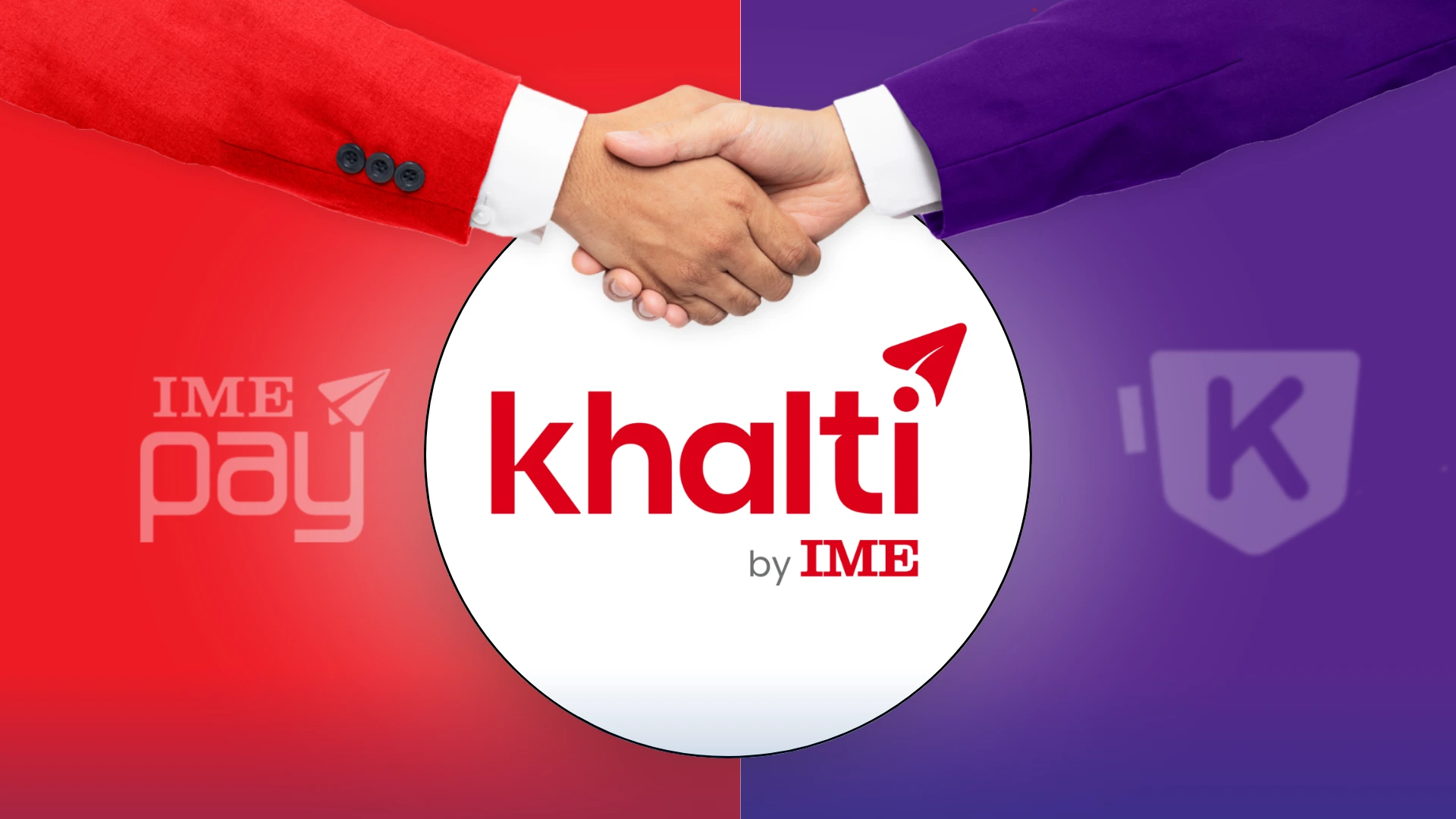At Global IME Bank, we are committed to keeping you at the forefront of financial innovation. As Nepal’s digital financial landscape rapidly evolves, we believe in fostering dialogue and sharing insights from leaders who are shaping this exciting future.
It was our distinct honor to recently host Mr. Binay Khadka, CEO of IME Khalti Limited, on our podcast. In a truly candid and insightful conversation, Mr. Khadka delved into the transformative journey of Khalti and IME Pay’s historic merger, their ambitious vision for financial inclusion, and the dynamic evolution of Nepal’s digital payment ecosystem.
This edition of our newsletter brings you the key takeaways from this illuminating discussion, highlighting how these developments are set to revolutionize your financial experience.
The Khalti and IME Pay Merger
Mr. Khadka began by clarifying that the monumental merger of Khalti and IME Pay, two of Nepal’s pioneering digital wallets, was not a measure to avert failure, but rather a bold strategic move designed to achieve unprecedented success and accelerate progress. This landmark event, the first of its kind in Nepal’s digital payment history, was meticulously orchestrated to harness the distinct yet complementary strengths of both entities.
Khalti, renowned for its youthful, innovative spirit and vibrant user base, seamlessly integrated with IME Pay’s profound expertise in the remittance sector and its forward-thinking “neo-bank” approach. The underlying vision, a powerful driving force for both companies, converged on a singular, overarching goal: to advance financial inclusion across Nepal.
The rationale behind this strategic merger was multifaceted and compelling, rooted in three critical imperatives:
- Optimizing Resource Utilization: A core objective was to eliminate the costly and inefficient duplication of efforts in building separate, proprietary digital ecosystems. By merging, IME Khalti Limited can now channel significant resources into groundbreaking new innovations, delivering enhanced value to its users and the broader market. This strategic consolidation ensures that investment is focused on future-oriented solutions rather than redundant infrastructure.
- Moving Beyond Core Payments: While both Khalti and IME Pay had established formidable presences in the core payments sector, there was a profound realization that the realm of FinTech extends “far beyond” simple transactions. The future of digital finance encompasses a much broader spectrum, including critical areas such as investments, small-ticket loans, and micro-insurance. These advanced financial services demand substantial and sustained investment in technology, product development, and market expansion. The merger provides the necessary scale and resources to pursue these ambitious ventures effectively.
- Strategic Alignment and Synergy: Fundamentally, both companies shared an identical dream, vision, and mission: to provide comprehensive digital financial services and empower individuals with effective personal finance management tools. The synergistic benefits derived from combining their complementary revenue streams and diverse business segments presented an overwhelmingly persuasive case to investors, cementing their belief in the immense potential of this unified entity.
The journey to finalize this historic merger was extensive and demanded an extraordinary level of dedication and collaboration. It spanned approximately eleven and a half months, involving countless hours of meticulous work from every member of the team. This monumental undertaking encompassed every aspect of the integration, from complex technology unification and the development of a cohesive new brand identity to exhaustive communication efforts with thousands of merchants and millions of users.
Currently, users are navigating a carefully managed transition phase. Impressively, over 100,000 active users successfully migrated from the IME Pay platform to Khalti’s unified ecosystem in a mere ten days. The company is actively working towards achieving full user migration by the end of Ashwin (Nepali calendar month), ensuring a smooth and seamless experience for everyone.
Driving Financial Inclusion in Rural Nepal
Mr. Khadka emphasized Khalti By IME’s deep commitment to driving financial inclusion, particularly in rural Nepal, where financial literacy and digital adoption often lag. To bridge this gap, the company employs a robust “Authorized Representative” or “Agency Model.”
This extensive network comprises over 152,000 dedicated agents strategically located across all 77 districts and 753 local levels of Nepal. These agents play a pivotal role, providing essential digital financial services such as utility bill payments and remittance reception to individuals who may not possess smartphones or sufficient digital literacy.
The overarching goal of this agency model is to gradually transition these underserved users into the formal financial channel. This is achieved through strategic partnerships with banks, including Global IME Bank, facilitating seamless account onboarding and providing access to small-ticket loans, thereby empowering rural communities with greater financial access and opportunity.
Fortifying Security: Combating Fraud and Protecting Data
In an era characterized by the escalating threat of digital fraud, Khalti By IME maintains an unwavering focus on two critical pillars: proactive awareness campaigns and robust security infrastructure.
- Awareness: The company continuously deploys comprehensive awareness campaigns across various social media platforms and other communication channels. These initiatives are often conducted in close collaboration with regulatory bodies and other financial institutions. A key focus is educating users about common scam tactics, particularly those exploiting “Greed, Influence, and Fear” (GIF), and underscoring the paramount importance of thorough KYC (Know Your Customer) verification to protect personal financial information.
- Infrastructure: Khalti By IME adheres to the most stringent international security standards. Their platform boasts ISO certification, complies with PCI (Payment Card Industry) standards, undergoes regular and rigorous security audits, and conducts intensive VAPT (Vulnerability Assessment and Penetration Testing). Innovative security measures, such as “mobile originated OTP,” have demonstrably reduced instances of fraud. The company reiterates its “zero tolerance” policy for any compromise on user privacy, data integrity, and application security, reinforcing its commitment to safeguarding your financial well-being.
Industry Collaboration through the PSP Association
As the newly appointed Chairman of the Payment Service Provider (PSP) Association, Mr. Khadka shed light on the collective efforts being undertaken to strengthen Nepal’s digital payment industry as a whole. With an impressive collective user base exceeding 27 million and processing a staggering 35 million monthly transactions, the PSP Association is committed to several key initiatives:
- Promoting Awareness Programs: Jointly developing and disseminating educational content to enhance public understanding of digital payments and security best practices.
- Establishing Common Benchmarking Systems and Leveraging AI for AML Compliance: Implementing standardized performance metrics and utilizing advanced AI tools for Anti-Money Laundering (AML) compliance to enhance efficiency and optimize operational costs across the industry.
- Supporting Newer and Smaller Institutions: Providing collaborative support, such as sharing aggregation systems for utility bill payments, to foster growth and innovation within the sector.
- Engaging with Nepal Rastra Bank and the Payment Board: Actively participating in dialogues with regulatory bodies to advocate for crucial policy reforms that will expand the scope of work and capabilities for digital wallet companies, driving further innovation and market development.
The Regulatory Landscape and Future Aspirations
While commending Nepal Rastra Bank for its progressive directives in shaping the digital financial landscape, Mr. Khadka also articulated key expectations for further regulatory evolution. These forward-looking aspirations aim to unlock the full potential of digital finance in Nepal:
- Expanding the Scope for Digital Lending, Micro-savings, and Formalizing Government Payments: Advocating for regulatory frameworks that facilitate broader digital lending opportunities, encourage micro-savings initiatives, and formalize government payments through digital channels, enhancing transparency and efficiency.
- Government Support through Financial Incentives for QR Payments: Proposing government incentives for QR code-based payments to accelerate the formalization of the economy and further enhance financial transparency.
- Considering Existing Wallets in the Neo-bank Concept: Suggesting that existing digital wallets, with their vast user bases and established infrastructure, be strategically integrated into the emerging “neo-bank” concept, rather than creating duplicate ecosystems, thereby leveraging existing digital assets for broader financial inclusion.
- Developing Foundational Digital Public Infrastructure: Emphasizing the critical need for robust foundational Digital Public Infrastructure, similar to India’s UPI (Unified Payments Interface). This includes developing a National ID system, establishing comprehensive credit information bureaus, and creating national payment gateways to significantly streamline user onboarding processes and enhance interoperability across the financial ecosystem.
Nepal’s Digital Edge: Rapid Adoption and Evolution
Mr. Khadka highlighted a remarkable aspect of Nepal’s financial journey: its surprisingly strong and rapid adoption of digital payments. He noted that Nepal’s real-time settlement for digital payments is often faster than in some developed European countries, taking mere seconds compared to hours elsewhere. This incredible pace of adoption is partly due to Nepal largely bypassing traditional card adoption to directly embrace ubiquitous QR code payments.
This rapid digital transformation was significantly facilitated by the widespread proliferation of smartphones, initially adopted by migrant workers’ families for communication, which then naturally transitioned into their primary tool for payment usage. While digital adoption is commendable, Mr. Khadka pointed out a critical gap: the absence of foundational digital public infrastructure, akin to India’s UPI, which requires focused government initiative to address.
Digital Remittance: Driving Investment and Savings
Building upon IME’s pioneering legacy in the remittance sector, Khalti By IME has already implemented a seamless system for direct remittance receipt into Khalti wallets. The broader, more impactful vision extends beyond mere receipt: to ensure that the billions of dollars flowing into Nepal as remittances are not simply withdrawn and held as idle cash, but are actively invested and saved.
By forging strong partnerships with banks, including Global IME Bank, and strategically leveraging digital channels, Khalti By IME aims to actively encourage remittance recipients to channel their funds into productive avenues such as capital market instruments, insurance policies, and various banking instruments. This concerted effort is designed to foster significant capital generation and enhance overall economic productivity within the nation.
Looking Ahead: A Bright Future
Despite the ongoing challenges posed by human resource migration, Khalti By IME remains steadfast in maintaining an agile and dynamic work environment. Their commitment extends to continuous talent development and retention strategies, ensuring a strong and capable workforce for the future.
Mr. Khadka’s personal journey, from humble beginnings to his current leadership role as CEO in such a rapidly evolving industry, serves as a powerful testament to the indispensable qualities of risk-taking, patience, and unwavering perseverance. He expressed profound satisfaction in the tangible social impact of digital payments, highlighting how they are genuinely making millions of lives easier by saving invaluable productive hours and significantly reducing congestion in daily transactions.
His inspiring message to young professionals aspiring to a career in FinTech resonates deeply: “Match your persona with your passion, take calculated risks early in your career, and leverage the ample opportunities available today through accessible learning resources and AI-driven innovations.”
Global IME Bank extends its heartfelt congratulations to IME Khalti Limited on their successful merger. We eagerly anticipate continuing our strong partnership, working collaboratively to further build and fortify Nepal’s burgeoning digital ecosystem. Together, we are committed to shaping a more inclusive, efficient, and prosperous financial future for all.






